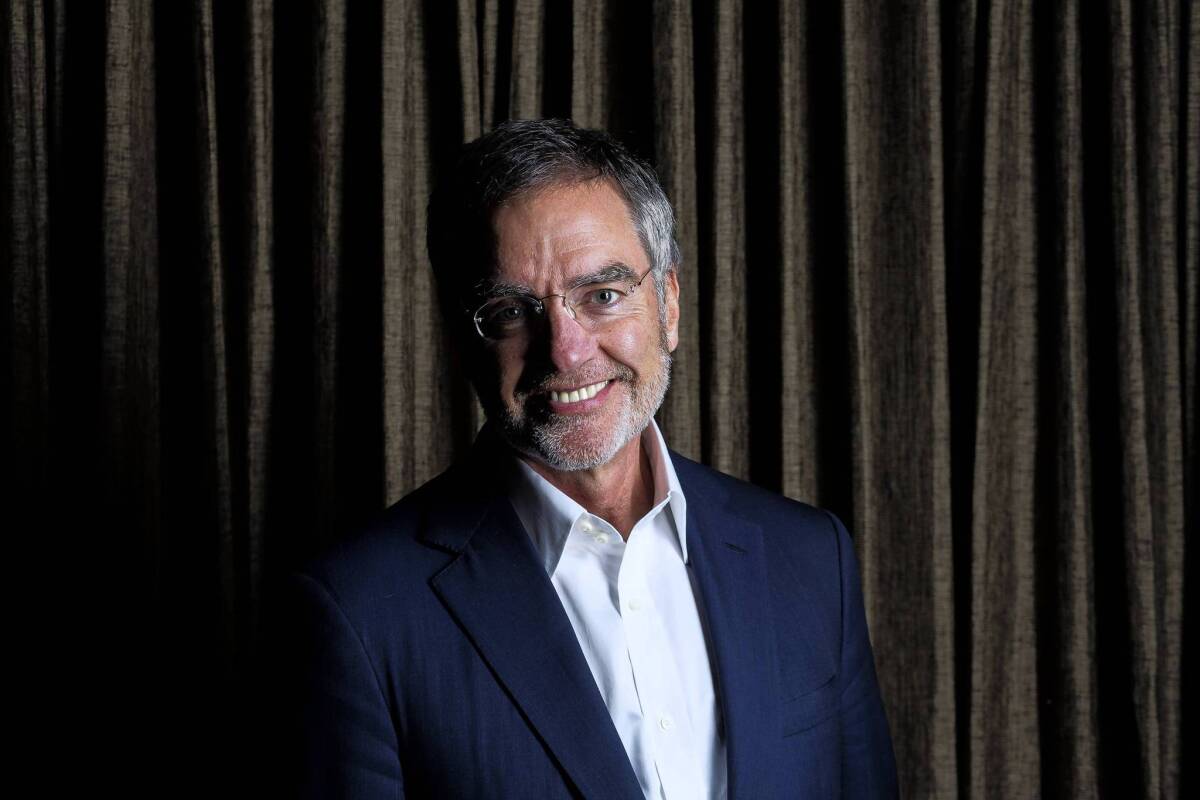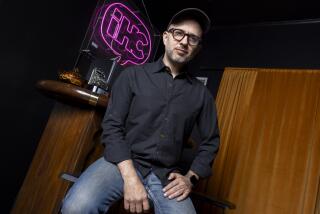Clear Channel’s Bob Pittman sees ‘a time of feast’ for radio

- Share via
Bob Pittman was best known as the co-founder of MTV and chief operating officer of America Online Inc. — and later AOL Time Warner — before becoming Chairman and chief executive of Clear Channel in 2011.
Clear Channel, an outdoor advertising giant and the nation’s biggest radio company, operates 850 radio stations in the U.S. and the iHeartRadio online music streaming service, and also produces live events such as the iHeartRadio Music Festival. The company officially opened its new iHeartRadio Theater on Tuesday night with a performance by Katy Perry, celebrating the release of her album “Prism.”
The show, filmed inside the former “Tonight Show” studio in Burbank, was broadcast live on 175 Clear Channel radio stations and will get a broadcast TV airing from the CW network on Friday at 9 p.m.
ON LOCATION: Where the cameras roll
Pittman sat down with the Los Angeles Times just before the Perry event to talk about the company’s plans for the new theater and the radio business, which is facing growing competition from Internet companies such as Pandora Media Inc. and Spotify.
What does this event at this theater say about the evolution of Clear Channel as a radio company?
We’re clearly a multi-platform company. Our broadcast stations reach over 240 million people a month. Our outdoor reach is almost 150 million people a month, almost the size of broadcast television. Our digital reach is up to over 60 million now. Our iHeartRadio product was the fastest in the history of the Internet to reach 20 million registered users. It looks like we’ll be the second-fastest to 40 million. And now we’re doing TV shows. Everything begins to become very blurry.
How important is the CW deal in this effort?
It’s a piece of the puzzle. Our view is, we need to be everywhere our listeners are. This is the iHeartRadio Theater, but it’s really a TV studio, so it gives us enormous flexibility and capabilities.
PHOTOS: 2012 highest-paid media executives
Why pick the old Jay Leno “Tonight Show” studio?
There’s a real history here. I think there’s something to places that have a history, and there’s a mojo or vibe that I think is always important. For us, the opportunity presented itself and we said, “God, this is just perfect.”
What does this company look like five to 10 years from now, and how does the theater fit into those plans?
We’re about massive reach and we’re about relationships with the consumer. We build something big, powerful and strong and we’ll figure out how to make money on it. We’ve built this theater, and we haven’t pre-sold anything. We don’t know how we’ll make money on it, but it’s important to who we are. Right now, there’s probably no one that does anything like what we’re doing with the iHeartRadio Theater in L.A., the iHeartRadio Theater in New York, the iHeartRadio music festival and the iHeartRadio Pool Party in the spring. We’re building out all these major events for our listeners, and they’ll all come together financially, eventually.
PHOTOS: Celebrities by The Times
How does iHeartRadio work for Clear Channel at a time when Internet radio doesn’t seem to be very profitable?
Remember, we do all this at an incremental cost. If you look at iHeartRadio, Pandora and all the Internet radio players, it’s only 8% of all the listening. The other 92% is broadcast radio, so we’ve not forgotten where the monster is. Actually, broadcast radio has increased, and digital is in addition to that, so this is really a time of feast for the radio business, and I think the Internet has really helped us expand our reach.
How many of these album-release type events do you do with artists?
We did Justin Timberlake earlier in the year and we did Taylor Swift. It’s not surprising that those two were the biggest-selling albums, in physical sales, in the last six years, and we made them an event. We just did one with Paul McCartney. We’re looking at artists and trying to make music more exciting again. We’re trying to make the release of their music a big event, which it is, but it’s sort of been forgotten about. And so we’re bringing some of the excitement back into it.
What do these moves into TV and the Web say about where the radio industry is right now?
It says the radio industry has never been bigger or better. With the TV business turning into delayed viewing and cord cutting and binge viewing, radio is the last mass-reach, real-time medium. We’ve never been more important to the consumer or the advertiser. The radio industry may have been coasting a little bit, but what we’re trying to do is amp up our performance and show that we’re not limited to our towers and transmitters.
Speaking of the CW, it looked as if ratings for the iHeartRadio Pool Party weren’t as strong as you may have hoped.
Actually, I thought they were pretty good, considering what we were doing. If you look at over the course of the year, we’ve done very well with the CW, and they generally do a couple airings of the show, and actually I’m really happy with them. They’re a lot about live viewers, they’re a lot about this demo that’s interested in what’s new, hot and hip, and that fits us well. So we love that relationship. We found them to be nimble and quick, and they’re great for events like this.
More to Read
Sign up for The Envelope
Get exclusive awards season news, in-depth interviews and columnist Glenn Whipp’s must-read analysis straight to your inbox.
You may occasionally receive promotional content from the Los Angeles Times.







